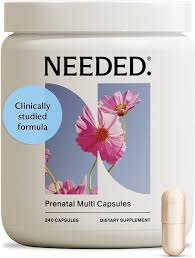Attention Deficit Hyperactivity Disorder (ADHD) is a condition that affects millions of children and adults worldwide. It can manifest as difficulty focusing, impulsivity, and hyperactivity, often making daily tasks challenging. While medication is commonly prescribed, many parents and adults seek natural alternatives or complementary treatments to manage ADHD symptoms. Supplements can be a powerful tool in this approach, supporting brain health, enhancing focus, and improving overall well-being.
In this blog post, we'll explore the top five supplements that can be beneficial for individuals with ADHD, highlighting their benefits, safety, and effectiveness.
1. Omega-3 Fatty Acids
Why It's Important:
Omega-3 fatty acids, particularly EPA and DHA, are essential for brain health. These healthy fats are critical components of cell membranes and play a vital role in brain function, mood regulation, and cognitive processes. Research has shown that individuals with ADHD often have lower levels of omega-3 fatty acids, and supplementing can help improve attention, reduce hyperactivity, and enhance overall mental health.
How It Helps ADHD:
- Enhances focus and attention
- Reduces symptoms of hyperactivity
- Supports overall brain health
Best Sources:
Omega-3 supplements are commonly derived from fish oil, but vegetarian options like algal oil are also available. Look for high-quality supplements that contain a balanced ratio of EPA to DHA.
Recommended Dosage:
For children, a daily dose of 1,000 to 2,000 mg is typically recommended, while adults may benefit from 2,000 to 3,000 mg per day. Always consult with a healthcare provider before starting any new supplement.
Purchase Designs for Health Omega 3 Smoothie for kids HERE

2. Magnesium
Why It's Important:
Magnesium is a crucial mineral involved in over 300 biochemical reactions in the body, including nerve transmission and muscle function. Magnesium deficiency is common in individuals with ADHD and can exacerbate symptoms such as irritability, restlessness, and difficulty concentrating.
How It Helps ADHD:
- Calms the nervous system
- Improves sleep quality
- Reduces hyperactivity and irritability
Best Sources:
Magnesium supplements come in various forms, including magnesium citrate, magnesium glycinate, and magnesium threonate. Magnesium threonate is particularly noted for its ability to cross the blood-brain barrier and directly support brain function.
Recommended Dosage:
Children typically require 100 to 200 mg daily, while adults may need 200 to 400 mg. Starting with a lower dose and gradually increasing it can help minimize potential digestive discomfort.
Purchase Designs for Health Tri-Mag Supreme Here

3. Zinc
Why It's Important:
Zinc is an essential trace mineral that supports immune function, DNA synthesis, and brain health. It plays a key role in neurotransmitter regulation and has been found to influence dopamine, a neurotransmitter that is often imbalanced in individuals with ADHD.
How It Helps ADHD:
- Supports dopamine production and regulation
- Enhances cognitive function
- May reduce impulsivity and hyperactivity
Best Sources:
Zinc supplements are available as zinc gluconate, zinc citrate, or zinc picolinate. Zinc picolinate is known for its superior absorption.
Recommended Dosage:
Children may benefit from 5 to 10 mg of zinc daily, while adults may require 15 to 30 mg. Excessive zinc intake can interfere with copper absorption, so it's important not to exceed the recommended dose.
4. Iron
Why It's Important:
Iron is a vital mineral for oxygen transport and energy production. It also plays a critical role in dopamine regulation. Studies have shown that low iron levels are common in individuals with ADHD, particularly children, and can contribute to cognitive difficulties and behavioral challenges.
How It Helps ADHD:
- Supports cognitive development
- Regulates dopamine levels
- Enhances focus and attention
Best Sources:
Iron supplements come in various forms, including ferrous sulfate, ferrous gluconate, and ferrous bisglycinate. Ferrous bisglycinate is often preferred due to its gentle impact on the stomach.
Recommended Dosage:
Children should receive iron under medical supervision, as excessive iron can be harmful. Typically, a dose of 10 to 15 mg daily is sufficient. Adults may require 18 mg daily, especially women of childbearing age.
5. Vitamin B6 and B12
Why They're Important:
Vitamin B6 and B12 are part of the B-complex group of vitamins, essential for brain health, neurotransmitter production, and energy metabolism. Vitamin B6 helps in the production of serotonin, dopamine, and norepinephrine, all of which are involved in mood regulation and cognitive function. Vitamin B12 is crucial for nerve health and the formation of red blood cells.
How They Help ADHD:
- Support neurotransmitter balance
- Improve mood and reduce anxiety
- Enhance cognitive performance
Best Sources:
B6 and B12 supplements can be taken individually or as part of a B-complex supplement. They are available in various forms, including tablets, capsules, and sublingual (under-the-tongue) forms.
Recommended Dosage:
For children, 1 to 2 mg of vitamin B6 and 2.4 mcg of vitamin B12 daily are generally recommended. Adults may need higher doses, around 10 to 25 mg of B6 and 2.4 mcg of B12. Since B vitamins are water-soluble, they are generally safe, but it's still wise to consult with a healthcare provider.
Conclusion
While supplements can be a valuable part of a comprehensive approach to managing ADHD, they should be used in conjunction with other treatments such as behavioral therapy, dietary changes, and, if necessary, medication. It's essential to consult with a healthcare professional before starting any supplement regimen, particularly for children, to ensure safety and effectiveness.
By incorporating these top five supplements—Omega-3 fatty acids, Magnesium, Zinc, Iron, and Vitamins B6 and B12—into a well-rounded treatment plan, individuals with ADHD can experience improved focus, reduced hyperactivity, and enhanced overall well-being. Remember, every individual is unique, so finding the right combination and dosage of supplements may take some time and professional guidance.










